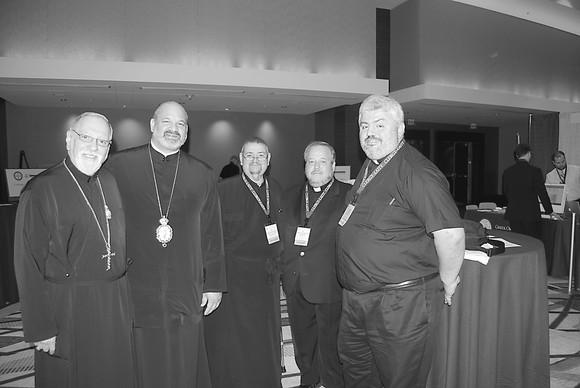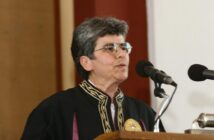
A group of Greek clergy, including Archimandrite Evgenios Papas, Bishop Dimitrios of Mokissos, Fr. George Delis, Archimandrite Timothy Bakakos, and Fr. Ioannis Kalomas at the Clergy Laity Congress in Atlanta GA in 2010.
Source: The National Herald
by Theodore Kalmoukos
BOSTON, MA – A newly-assigned priest that has just graduated from the Seminary should make an annual salary of $49,128-$66,528 plus extra benefits such as insurance, an automobile, a house (or an allowance for one) retirement contributions, seminars expenses, among other ones. A priest with 35 years of ministry and more will earn $113,856-$120,144, according to the Clergy Compensation Plan for 2013.
The priests’ salaries are the biggest expense of the parishes’ annual budgets, along with the annual monetary allocation they pay to the Archdiocese for what are called ministries.
According to the official Clergy Compensation Plan for 2013, a priest with service of up to five years can expect to earn $49,128-$66,528; 6-10 years $68,528-$74,136; 11-15 years $74,136-84,960; 16-20 years $84,960-$94,440; 21-25 years $94,440-$101,136; 26-30 years $101,136-$107,616; 31-35 years $107,616-$113,856; and over 35 years $113,856-$120,144.
According to documents acquired by TNH, “in light of the continuing difficulties being faced by so many of the faithful and parishes, the remunerations ranges will remain the same for the year 2013.” TNH has learned that in many parishes the income has degreased sharply.
The Plan also provides that: “a) the annual minimum increase in a clergyman’s remuneration must include an annual cost of living increase beginning January 1st of each year. When using these remuneration ranges, the Parish Council should factor in the relative cost of living for its geographic area”.
b) “In the event a parish provides ‘housing’ by making available a parish owned home, then an equitable and reasonable ‘deduction adjustment’ should be made from the Salary and Housing Allowance figures above, based on the local fair market rental value of the home being provided.”
The plan also provides that “in addition to the above, the parish must provide:
1) an automobile (which the parish purchases or leases) for use by the priest, with all related expenses paid by the parish.
2) Social Security/Medicare taxes (FICA/SECA equal to the maximum self-employment Social Security/Medicare tax each year, currently 15.3% of Salary and the Housing Allowance or rental value of a parish home).
3) The monthly health insurance premium for the Archdiocese-sponsored and approved Orthodox Health Plan, either single or family coverage, as appropriate. All clergymen of the Archdiocese are required to participate in the Orthodox Health Plan.
4) A minimum annual vacation of 15 days (two weeks) to a maximum of five weeks, taking into consideration the clergyman’s cumulative years of service to the Archdiocese.
5) Expenses for attending District/Metropolis Clergy-Laity Assemblies and Retreats, the Biennial Clergy-Laity Congress, Clergy Continuing Education Programs and the Archdiocese Presbyters Council Retreat.
6) A three-month sabbatical leave for every six years of service with the same parish.
It is stated in the Compensation Plan that “all parishes are obligated to pay the monthly Archdiocese Benefits Contribution, which for the year 2013 is $500. This includes parishes without a full-time priest. Those parishes with more than one clergyman are required to pay $500 for each assigned clergyman…The Archdiocese Benefits Contribution is not a part of a priest’s remuneration package.”
The above salary scale is not always observed by the local Metropolises. In many parishes there are huge differences of salaries and benefits. Some Metropolitans in order to take care “their own boys” as the expression goes, put pressure on the parishes to give them more money, in some instances even double the amount that the Archdiocesan salary scale directs. Generally in Metropolises, it is the metropolitan, not the chancellor, that selects a priest. In many cases, the unwritten laws of friendship and favoritism prevail over education, experience, and overall ability.
In other instances, the metropolitans turn their heads the other way. TNH has learned that there are priests with 50-plus years of continuous service in the same parish whose annual salary does not exceed $50,000, while some newly-appointed priests begin at $80,000. The priest in the Archdiocesan Cathedral of the Holy Trinity in New York, appointed by Archbishop Demetrios, earns the highest salary of any priest in the country, plus benefits, while other clergy live below poverty line.
All family benefits that apply to married priests with children, also apply to the celibate priests – Archimandrites or priest-monks. It is also true that many priests’ salaries is in some instances double and triple the $80,000 (approximate) salary of the metropolitans. All of metropolitans’ expenses are paid.
It is widely known that the Greek-Orthodox Clergy in the United States are the highest paid among the Orthodox Jurisdictions. One of the basic reasons that so many converts are trying to get into the Greek-Orthodox Archdiocese as priests is the fact that the Archdiocese is considered “the golden fish” of Orthodoxy in terms of salary and benefits.
Above and beyond the basic employment package are gratuities, “tyhera,” which the faithful give at the time of a sacrament – such as wedding or baptism, or even at a funeral. The gratuities are similar to the tips that the customers give to waitstaff in restaurants or hotel bellhops. There are parishes that present to the faithful their financial obligations in writing once the people call or visit the church office to set a day not only for a joyous occasion, but even for the funeral of a loved one. The faithful are asked to give an extra amount to the priest, the cantor, the sexton, and for the use of the church despite the fact that the faithful pay annually their dues or stewardship.
In many instances, the priests have asked to include their “tip” in the general expense of the funeral, as determined by funeral directors. There are also cases in which the relatives of the departed in their grief and deep pain approach the priests and give them an extra “tip” in cash which they take it without telling the relatives that they have already been paid a “tip” through the funeral director.
The custom of gratuities applies to many hierarchs who get from $500 to $1,000 and even higher when they officiate in Vesper Service or in a Liturgy. They might not ask for it directly, but the priests play the intermediate role recommending to the parish council to “give something to the bishop,” and they also are given such tips for officiating at weddings, baptisms, and funerals.
IN GREECE
The priests and the Bishops in Greece are paid by the government and they are considered state employees. According to the documents acquired by TNH from the Greece’s State Treasury, the gross salary of a newly-ordained priest is 1,092 euros and the net is about 770. A priest with 10-year ministry earns 1,381 in gross and 1,032 net.
The metropolitans with 30 years in ministry get 2,534 gross euros and 1,750 net. The Archbishop of Athens and All Greece with 33 years in ministry gets 2,978 gross and 2,213 net.
[subscribe2]



11 Comments
What would Saint Paul have to say about this?
There are many clergy in Britain and elsewhere who put far more into their parishes than ever they receive
After many years with the Romanian Episcopate I along with ST Paul must be in shock in my first mission parish I received $25 a Liturgy, 650 a month in my second parish. At this time at age 79 I have started up a third “pre -mission Parish” My salary is zero. I have SSA and a small pension Good LORD I am not in it for the money, Priesthood is a VOCATION not a profession. I have too much work to do so no vacations. In the Jurisdiction we are talking about some of there priests make more than $100,000 dllrs. and then some. More than many doctors etc. The church is a hospital for sinners not a money making scam to support priests and there ever hungry Episcopates. If Orthodoxy does not change we will fail in America too many chiefs and not enough Indians, very large Temples why, for every super temple we could have built four smaller churches to serve a spreading laity now many miles from these large Temples. When non-believers hear about some of our salaries and various paid vacations we become a laughing matter not men who serve the suffering Christ. I believe ST Paul has rolled over many times in his grave, good Lord look what we have become a money making giant living in the sin of Phyletism, its no wonder we are losing people. William John
My, my, my! Priests are not angels. They are human beings like any other. They have families, they have relatives who depend on them, they have even parishioners who need their assistance too! They have to fulfill the 5 Abraham Maslow’s Theory of hierarchy of needs like any other person ie basic needs, safety needs, social needs, self esteem and self actualization. As much as priesthood is a vocation, it does not mean that a priest should sleep hungry nor does it mean that parishioners should not give to the priest. As much as St Paul says that he works for his survival (a priest must get another work for his survival), Christ tell the disciples that a shepherd feeds from his flock ( a priest should be fed by his parishioners). Both St. Paul and Christ Jesus are right. It will always depend on the type of parishioners the priest is having and the type of priest the parishioners are having.
Please don’t judge the priests wrongly.
Sad to read this. Shame on those who are treating the vocation as a job for life/security for life. God bless the Fathers/ Mothers who see the people, the flock of Christ, and only accept for their need, not their greed.
how true.money,money,money,… .these priests care only about themselves in general.
Guys, guys, guys!
You’ve gotta look at the other side. Many talented and dedicated young men and their families would love to serve God in the priestly vocation, but feel unable to do so due to the total lack of financial support. Our priests should be supported.
In my archdiocese, something lik 90% of priests have to have a full time job in addition to trying to fulfill their vocation as a full time priest. Their families are struggling. Is this really necessary?
This article is poorly written, provides no citations for its claims, and is grossly biased. Many of the articles on ocl.org in general reflect this kind of shoddy journalism and sensationalism (e.g. “Hilander to be visited by women soon?” –NO!). Priests deserve a fair compensation for their work, just like any other profession. I’m sure a few priests abuse this, but the vast majority do not. Most jurisdictions do not pay their priests anywhere near these figures — in fact, a new priest will usually make less than half of the $49,000 cited, and may never be paid $49,000 a year in his whole career. This is why priests are increasingly taking secular jobs to compensate–a move which also draws the ire of the laity. What is a living wage? Would your average American layman be content to be paid $25,000 a year after 10 years of service to the same company, having earned a professional degree, paying back student loans, working 24 hours 7 days a week, and raising a family–which incidentally comes second to his job? NO. Why do you attack priests for wanting a living wage and security for their families? As the Great Fast approaches, I pray you take some time to reflect on all the hard work your priest does, especially during the Fast, and you thank God that He has given you such a devoted man to care for your soul
See the online budget for 2023 for Assumption GOA of Scottsdale. Add up all of the wages plus benefits, and you have almost $200K per year for the head priest. Apostles of Christ, not of the World? Also, $114,000 per year goes to the Diocese. The assistant priest with less than five years of tenure is receiving a healthy salary for his experience. Yet, said churches say they have minimal surplus income to feed the homeless.
Mr Evangelos, your concern is not with the parish priest but rather with the Archdiocese and his parish. Salaries of clergy are determined not by the priest but rather through guidelines established at the clergy /laity congress in conjunction with the local parish.
IT IS CALLED THE BROTHERHOOD. WE PAY THE PRIESTS, NOT THE ARCHDIOCESE! IT IS LIKE AN EMPLOYEE TELLING HIS EMPLOYER WHAT HE SHOULD PAY HIM. AT LEAST UNION MEMBERS NEGOTIATE WITH THEIR EMPLOYER. THERE IS NO NEGOTIATION BETWEEN THE PARISH WHO PAYS THE PRIEST AND THE PRIEST. WHAT A RACKET. IF THEY DON’T PAY UP, THEY WILL HAVE NO PROBLEM IN SHUTTING DOWN THE CHURCH, LIKE WAS DONE FOR A SHORT TIME IN SALT LAKE CITY. APOSTLES OF CHRIST WERE SPECIAL SINCE THEY MADE SACRIFICES LIKE JESUS. SACRIFICE IS NOT IN THE GOA VOCABULARY. EVENTUALLY, MEMBERS WILL WAKE UP AND LEAVE OR GREATLY REDUCE THEIR TITHING AND GIVE SAID TITHING DO THE POOR WITHIN THE CHURCH.
Mr. Evangelos, I find it interesting that you have not responded to my post. My suspicion is that you do not like the priest in Scottsdale or maybe even all clergy. Again, salaries are not determined by the priest, but rather by the Archdiocese and the parish a priest serves. If you do not like priests’ salaries, you should attend a clergy/laity congress and object. Additionally, you should attend the general assembly of your local parish, if you are a member, and express your concern.